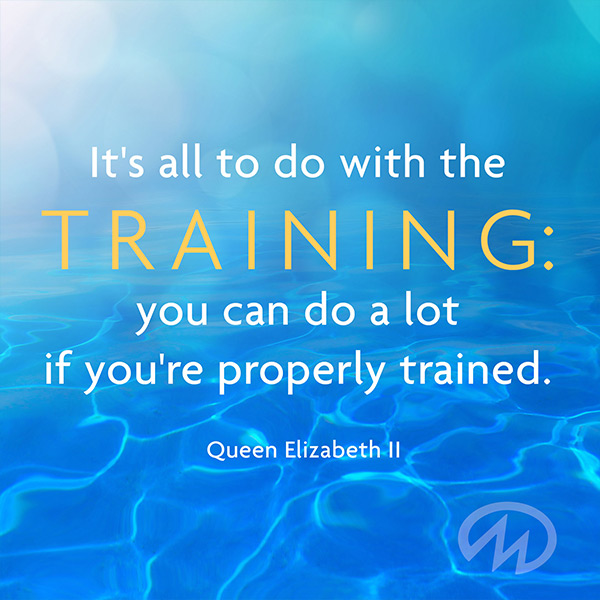
You Don't Have to be Michael Phelps to FOCUS
As a matter of fact, even Michael Phelps hasn’t always been good at focusing. Michael Phelps struggled in school and was diagnosed with ADHD, but when it came to swimming he was able to focus. And if you think that he was able to focus while swimming because he was supernaturally gifted, you’d only be partially right.

New international research commissioned by Speedo has revealed that swimmers agree that swimming helps to release stress and tension, makes them more confident about the way they look, and leaves them mentally refreshed.
Another study conducted by leading research specialists Ipsos MORI examined the psychological benefits of regular swimming. The results revealed that getting in the pool is the perfect way to unwind after a busy day with 74% of those surveyed agreeing that swimming helps release stress and tension.
You may be aware that stress can weaken our immune system, but did you know that stress can also weaken our brains. Swimming can help change your brain for the better by something called hippocampal neruogenesis -- the growth of new brain cells in a part of the brain that is weakened by chronic stress. Participating in stress-relieving swimming can help to build stronger brain cells...and stronger brain cells make it easier to focus!
If you’re looking to improve your focus, these 5 tips can help!

1. Set Priorities.
Setting priorities is integral to planning your day. Schedule the most difficult tasks early in the day and the easier ones later. When prioritizing your day, make a list of your required tasks. This will keep you organized as you tackle each and every issue.
2. Limit distractions and interruptions.
Keep your work area as free from distractions and interruptions as possible by maintaining quiet surroundings.

3. Complete duties in the easiest way possible.
For many tasks, there's more than one way to achieve a satisfactory, or even exemplary, result. Pick the way that is easiest for you to get the desired result. You may need to experiment to find what works best for you!
4. Keep a motivating picture nearby.
It’s easy to get distracted from the task at hand, but when you’re working on something important to you, having a motivating picture can remind you of why it is important to stay focused. Perhaps it motivates you to think of how your work helps you to take care of your family. In this case, a picture of your loved ones could be your motivating image. You might have a favorite affirmation, saying, or image of your main goal that motivates you to work harder, so a picture of this could remind you to stay on track.
5. Exercise.
Your mind benefits greatly when your body is active. Exercise is a key factor in your ability to think clearly. While we’re partial to swimming and all the benefits it provides, any activity that elevates your heart rate and gets your blood pumping is beneficial!

You Don't Have to be Michael Phelps to OVERCOME
Let’s face it...we all encounter obstacles in life. Joshua J. Marine said, "Challenges are what make life interesting and overcoming them is what makes life meaningful."

Whether big or small, the feeling we have when we overcome our challenges is amazing!
It doesn’t matter how old you are or what stage of life you’re in, you’re going to face challenges. You may encounter obstacles when you’re young and first starting off. It may be the challenge of finding a job you love or the right career for you. Perhaps it's finding the right formula for parenting, or maybe it’s the opposite, and you’re taking care of elderly parents. And then there’s those physical challenges that can stop you in your tracks, no matter what your age, searching for a solution.
We first met Patricia at the Michael Phelps Skill Center in Saco, Maine. Her challenge? Arthritis. This is her story of overcoming.

"I am 62 years old, and I suffer from arthritis in my right leg and hip. I experienced pain and cramps when walking, but it was worse when I’d try to climb stairs. It was like I needed to coach each leg up, then the other. Then one day I ran into a friend that I hadn’t seen since high school. We found that we had similar struggles, and she told me about the Michael Phelps Swim Spa. I had heard about the spas before, but I thought they were only used for athletic training. I didn’t realize that they were also used for someone like me -someone needing an exercise program for arthritis. In the past, I tried going to the gym, using a treadmill, and doing my stretches, but I was discouraged with the results. I remember starting in the swim spa on a Tuesday. Within two days I could go up stairs! And I mean straight up, only one foot per step! I said to my friend Paul, ‘Look at this - its working!’ After the third day, I felt incredible!
Exercising in the swim spa is now my normal. I love the propulsion of the swim spa. At the end of my workout, I turn the speed up to 40 and let it massage my legs, thighs and my IT bands. That has also played a big part in my therapy. Using the swim spa is fun and I not only have relief of my arthritis pain, but I feel stronger and healthier. My clothes are even fitting better!"

Exercising and training in water provides an ideal environment for more than 100 different kinds of arthritis. By using the natural resistance and buoyancy of water, people who suffer from arthritis can increase muscle strength and range of motion in a safer environment, without the effects of gravity, and begin higher level training earlier in their rehabilitation without adding stress to their injury. This makes overcoming a lot easier.
The Michael Phelps Swim Spa takes these benefits to a new level with a continuous current of water, therapeutic jets and the ability to customize the temperature of the water.
You don’t have to be Michael Phelps to overcome, but using the Michael Phelps Swim Spa can certainly help!

You Don't Have to be Michael Phelps to be CONFIDENT
You don’t have to be Michael Phelps to be confident! When you let your confidence shine through, you can reach your goals with ease.

When you're trying to reach your goals, the most important element that determines whether you succeed or fail is your selfconfidence.
Every worthwhile goal features hurdles and challenges along the way. Selfconfidence is the tool that keeps you going in the right direction when the challenges come. Selfassurance helps you climb the mountains and jump the hurdles that stand in the way of the success you deserve.
Use these strategies to build the confidence to go after your dreams and encounter success:
1. Keep a record.
Begin to keep a record of your successes, no matter how small. Write them in a notebook or journal. In the beginning, remember your successes of the past and write those down too. Whenever you begin to doubt yourself, look at your notebook and remind yourself of the times you've succeeded in the past.
In another notebook or section, write down your strengths. If you can't think of any, think about compliments you've received from others. As you go through each day, take note of your successes and strengths. Keep a record of your accomplishments that will fuel your success for the rest of your life.

2. Start with small goals.
If you have trouble recalling your successes or noticing your strengths, set a few small goals that are fairly easy to attain. The point is to achieve success and to allow that success to fuel you for greater challenges and greater victories in your life.
When you achieve the small goals you've set for yourself, write them down in your notebook. As your confidence grows, your heart will long to shoot for bigger goals and greater challenges. Your record of success will keep you pushing forward when doubts begin to creep in.
3. Act as if you're successful.
Have you heard the phrase “Fake it til you make it!”? That’s what we’re talking about here. A funny thing happens when you pretend you feel a certain emotion... you actually began to feel that emotion!
Try it right now. Slouch your shoulders, lean forward, and put a frown on as if you're absolutely exhausted. How do you feel? A little tired?
Now smile and begin to move your body like you do when you're excited. Feel the difference? To a large extent, you can control how you feel by the way you move your body. Pretend you're confident. Talk with confidence and move your body with confidence. The feelings will follow shortly.
4. Visualize your future.
Where do you see yourself in five years? Ten years? What kind of job do you have? Do you own your own business? How much money do you make?
Every day, close your eyes and take a few moments to run a mental movie about the future you've always dreamed about. Watch your success play out as if it's happening in the present and allow yourself to experience all of the senses. What does the scene look like? Smell like? Taste like? Feel like? Sound like?

Make your mental movie as vivid and detailed as possible for maximum effect. If you do this every day, your mind will begin to move you in the direction of your ideal future. You'll begin to take actions that support your success and lead you down the path of your dreams.
Your confidence will grow naturally with each success you experience, whether the success is in the real world or in your mind. Instead of constantly reliving the mistakes you've made in the past, relive the glorious future you deserve time and time again to grow your confidence and coach yourself toward its attainment.
Train Your Mind
We often worry about our physical fitness, but do we think much about the fitness of our minds? Just as we train our bodies for peak performance, we must also train our minds by coaching ourselves to think winning thoughts.
An effective way to train your mind is to look at challenges as opportunities instead of obstacles. A problem is only a problem if you allow it to be one. With each challenge comes an opportunity to learn and improve. So if you search for solutions, you'll find them.
When you internalize this mindset, you're sure to develop a winning attitude for a lifetime and reap the rewards of true success and happiness.

You Don't Have to be Michael Phelps to have a WINNING ATTITUDE
You don’t have to be Michael Phelps to have a winning attitude. You don’t even have to have a winning track record to have a winning attitude!

Here’s the truth: Your attitude can make or break you.
It's virtually indisputable that your attitude determines how far you'll go in life and a positive mental outlook can help you achieve optimal success.
Having a positive mental attitude helps you cope with challenges. When you're put to the test, you're more likely to find your inner strengths to overcome adversity, and that strength just might be your winning attitude. Whether or not you have the tools, skills, knowledge, or resources, your attitude can get you through tough times and come out on top.
On the other hand, an attitude filled with negative overtones makes everything much harder. You can't win when you go into the contest prepared to lose! If you expect to do well, your attitude will create positive, winning thoughts that help you succeed.
Cause and Effect
It's important to realize that for every effect in our lives, there's a specific cause. Through positive thoughts, we can control these causes and change effects or outcomes.
In order to change your future for the better, you must first alter your thoughts in the present.

For every positive seed you plant, your thoughts will grow and reward you with a positive harvest. Negative seeds have the opposite effect. They'll grow, but result in a spoiled and fruitless crop. You can't plant negative seeds in your mind and expect positive results. It just doesn't work that way.
A vivid and defining difference between people who are successful and those who aren't is the way they think. Successful people visualize their goals and take action to make them happen.
Unsuccessful people dwell on the negative, spend their time and energy complaining, and worry about things that are unimportant. This negativity wastes time and energy that could be harnessed toward achieving your goals.
Practice Makes Perfect
If you hone your positive thinking skills and develop the mental attitudes of a winner, you'll be able to overcome challenges without giving up. No matter how discouraging things may get or how intently others may try to dissuade you, with your winning attitude, you will be unstoppable!
A positive outlook enables you to focus on your goals with a tunnel vision that eliminates negative distractions and keeps you on a chartered course to success.
Train your mind to focus on the good. Develop a positive mantra or affirmation to help you overlook the negative and realize the power of optimism.
Train Your Mind

We often worry about our physical fitness, but do we think much about the fitness of our minds? Just as we train our bodies for peak performance, we must also train our minds by coaching ourselves to think winning thoughts.
An effective way to train your mind is to look at challenges as opportunities instead of obstacles. A problem is only a problem if you allow it to be one. With each challenge comes an opportunity to learn and improve. So if you search for solutions, you'll find them.
When you internalize this mindset, you're sure to develop a winning attitude for a lifetime and reap the rewards of true success and happiness.

You Don't Have to be Michael Phelps to SUCCEED
You don’t have to be Michael Phelps to succeed! While most wildly successful people all share certain traits, they're not superhuman traits. You can identify and develop these traits if you truly want to succeed. With hard work and determination, you can become one of the super successful...just like Michael Phelps.

In your journey to achieve your goals, you'll invariably have to deal with challenges, and even setbacks, from time to time. Every successful person faces some hardship along the way. However, it's important to remember that those with the drive to succeed will stop at nothing until they achieve their success.
Here are the top five super success traits, along with tips to help you acquire them:
1. Strong beliefs in yourself and what you're doing.
Put your whole heart into your endeavors and truly believe that you can succeed in what you set out to accomplish. If you run into a snag in the road, find something positive you can learn from the situation and use that to keep moving forward. If necessary, develop a new plan to overcome the challenge.
Think positively about yourself in all aspects of your life. In order to avoid being too critical, keep in mind that no one is perfect and accept that you'll make mistakes just like any other human. As valuable learning experiences, mistakes can actually benefit you.
2. Being organized and having clear plans.
Successful people are organized. They know what they want and how they're going to get there. They develop clear goals with specific action steps to achieve them. Plus, they know where they are on that road to success at all times.
You can develop this skill by starting with your general organizational skills. Start small by organizing your desk space. Then organize your notes. Move onto planning out your success by setting clear goals.
What do you want? How are you going to get there? Make a detailed plan of achievable action steps that will take you all the way through accomplishing your goal. Then follow your plan. It's your map to success.
3. Perseverance.

Sometimes the difference between success and failure is pure perseverance. There will be times when you're faced with difficult challenges. You may even feel like giving up. However, it's important to find the strength within you to pull yourself through, even in these tough times.
In order to develop perseverance, reflect on how you normally handle conflicts in life. Do you give up easily when faced with a challenge? Think of those times you gave up. What could you have done differently to encourage yourself to keep going?
After reflecting on your normal mode of operation, start changing your mindset about challenges. Instead of bemoaning the challenge, seek a way to overcome it so you can complete your task. Do this each day, with even small challenges, and soon you'll find yourself persevering through larger challenges with ease.
4. The drive to keep learning and achieving.

Super successful people realize that they're always students. They may be a master of a certain subject, but there's always something new they can develop or learn. Once they achieve one goal, then they use their current knowledge to help them learn something else that brings them even more success.
It's okay to take a break to enjoy your success once you've achieved a goal, but always ask yourself what's next. There's always a way that you can expand your success.
5. No fear of failure.
The super successful don't waste their time worrying about failure. They know that everyone must take certain risks if they're going to achieve success and that some ideas might not work out. You only fail if you give up or decide not to try at all. If you're still trying, then you haven't failed!
Just as with the other traits, overcoming a fear of failure can be accomplished by starting small. Start out by taking some minor risks. See how most of them work out fine when you expect the best and seek solutions to the challenges? The more ideas you try, the more successes you'll have, and you'll feel confident about forging ahead without fear.
To attain the life of the super successful, the most important thing to remember is to always give your all. Adopt these success traits as your own, and soon you'll find that nothing can stop you from achieving your goals!

You Don't Have to be Michael Phelps to PERSEVERE
Let’s face it...achieving your goals is rarely an easy journey. If it were easy, we'd all already be there. One of the keys to success is, without a doubt, perseverance. With improved perseverance you'll have that extra push from within to try, try again.

Humans have the tendency to want to control everything. Since there are always situations that can't be controlled, suffering occurs. Unfortunately, this suffering can't be escaped. Your goal should never be to avoid mistakes at all costs and seek control. Your goal should be to strengthen your perseverance by effectively dealing with the situation when things go awry.
Keep these tips in mind as you strengthen your perseverance:
Never Give up
When you have an ultimate goal, you owe it to yourself to completely follow through. There are going to be plenty of bumps in the road. Don't let any of these bumps bring you down. Always be seeking new ways of approaching problems.
Seek Out the Positive
When things have become overwhelmingly negative for you, seek out positive things in your life. You might want to surround yourself with loved ones or watch positive movies. You definitely want to seek out situations that'll promote your optimism and enthusiasm.
Take Action and Responsibility

Do whatever you can to inspire yourself to take bold actions toward your goal. Fight the urge to procrastinate or settle for less. Thinking about your goals is simply not enough; you need to start somewhere in order to get yourself there. You can't wait for a sign to get you to where you want to go, you must be willing to take action!
Get Help When Needed
Be wise enough to know when a situation warrants help from others. You don't need to take every single thing into your own hands. Instead, choose to follow advice from the people you trust or the experts in your chosen field. Flat out ask them how they've maintained the drive to keep going.
Know Your True Self
Knowing yourself and having organized thoughts can improve your perseverance. When youknow where you're going and the steps you need to take to get there, that's half the battle. That's why you need to take the proper amount of time for selfreflection. Know the true ins and outs of what you want and exactly why you want it.
Stop Bad Habits

Do everything in your power to put a stop to bad habits. If there are certain behaviors you've identified that are keeping you from achieving your goals, you need to get rid of them. This could be simply negative thinking or you might be fighting procrastination. When you concentrate on each bad habit individually, you'll be better able to deal with the problems that might exist.
Concentrate on Stress Management
Stress management and your level of perseverance are definitely related. When stress overwhelms you, it clouds your current thinking and brings on negativity. Your perseverance can't flourish in a negative environment. You must first conquer any problems you have with stress so you'll be better able to reach your goals.
Perseverance is likely already a part of your life. You just need to bring it out and strengthen its existence. It all boils down to the power of thought. As Henry Ford so wisely said, “Whether you think you can, or you think you can'tyou're right.”

You Don't Have to be Michael Phelps to DREAM
Remember when you were growing up and you wanted to be a famous singer or an astronaut? Maybe you dreamed of being a firefighter or becoming an actor. Somewhere along the way, we put our dreams aside for more practical pursuits.

C.S. Lewis said, “ You are never too old to set another goal or to dream a new dream.” And while you may not want to be an astronaut anymore, I bet there are other dreams still ruminating inside of you. Maybe you want to write a book or train for a triathlon. We all have dreams. Some are much larger and more complex than others, but they all have value.
Many people give up on their dreams because they don't see them coming to pass quickly enough. Have patience! Although your dream may not have come to pass yet, it can still be realized.
Making Your Dreams a Reality

While you can't force dreams to happen, you can take steps toward actualizing them. Maybe you want to travel to a specific place. Do you know anything about the culture and language there? Are you saving money each week or month toward your trip? You won't magically arrive there. You must plan and work toward what you want.
The same is true if you want to have a family, write a successful book, help others, move to another state, or anything else that interests you. Even if you try and fail, keep trying. Your dreams have value. Keep moving toward them, even if you face setbacks and challenges.
Visualizing and Planning for Your Dreams
In addition to physically working toward your dreams, mental preparation is important. That means you need to keep visualizing and dreaming. It helps to have something visual to keep you focused on accomplishing your dream.
Try These Techniques:

- Make a vision board where you can pin or glue symbols of what you want to see realized. Hang it somewhere where you will see it often.
- Write down your dreams to keep them fresh in your mind.
- Keep a journal of what you've done toward realizing your dreams each day or each week.
- Talk with others who share your goals and dreams to stay encouraged and excited.
Just because the way to your dream doesn't seem obvious to you just now, that doesn't mean there isn't a way. Something could change in the blink of an eye. Suddenly, you'll be able to see how and when your dream will be realized.

Begin to Set Goals
You don’t have to be Michael Phelps to begin setting goals. Without goals, there would be no passion, purpose, or drive in life. If your goals are too vague, you'll find much more difficulty on your journey than if you'd properly prepared in the first place.

Planning Your Goals
The planning phase is the most important stage when it comes to achieving your goals. Planning might come easy or hard for you, but one thing's for sure, without planning the end goal may not even exist at all.
While it's important to set up your own system that works for you, there are some simple goal setting strategies you can use to make your planning easier.
Consider the following tips for finding clarity in your goals:
- Decide what you want. Whether your goal is lofty or little, decide exactly what it is that you want. If you want money, how much? If you want to lose weight, how many pounds? If you want success, describe your vision of success?
Don't be afraid to take your time to figure out what you want. You don’t have to figure it all out today! At some point you'll need to sift through your thoughts and take action, but make sure you're acting on what's most important to you!
- Be specific. Be very detailed as you develop every part of your goal. Instead of a goal like "I want to be better at sports," consider a goal like "I want to shave 2 seconds off my breast stroke so I can make it to nationals." Just being "better" at sports is too vague. This can mean so many different things and your mind won’t be able to focus on any one route to your goal.

- Write it down. Write down your ideas and decisions. It doesn't matter if you use pencil and paper, a computer, or even a cell phone. What's important is the fact that you can keep track of a large amount of specific information instead of trying to remember everything. After all, goals only seem real when you see them clearly before you.
- Break down your goal into increments. If you have a lofty goal, it'll become manageable if you break it down into smaller pieces. Smaller pieces will make your goal seem less complex. Plus, it'll be easier for you to achieve your goal if everything is set out for you as minigoals, instead of just one huge feat.
- Repeat the process. Once you've found a good system, it's time to repeat the process. Clarify your other goals that you'd like to achieve.
For example, if you'd like to "spend more time with the family," which is too vague, make a list of specific family activities you'd like to do together, and then make more lists that detail how you can make those goals a reality.
Don't Wait For "Someday"

Some of the reasons why people tend to keep their goals vague is that they're actually afraid of achieving them. It sounds crazy but it's true!
After all, it's a whole lot easier to put off your goals and do nothing, than to take action to achieve it. But what good is a goal that merely resides on paper?
Once you've decided on a clear goal, it's time to take swift action to make it a reality. Don't wait for someday to achieve your goals. There's no time like the present…
You don't have to be Michael Phelps to BEGIN!




































